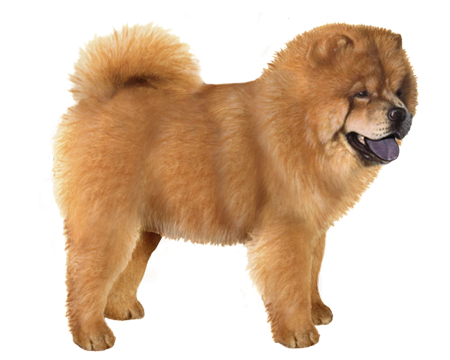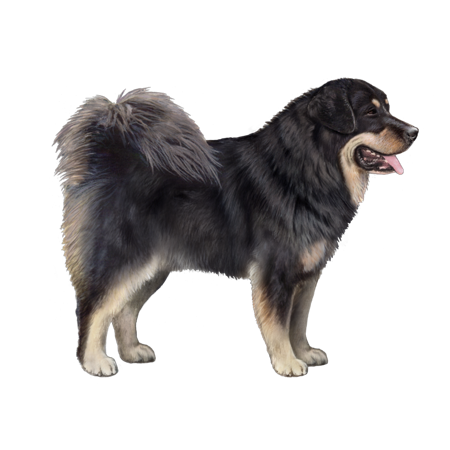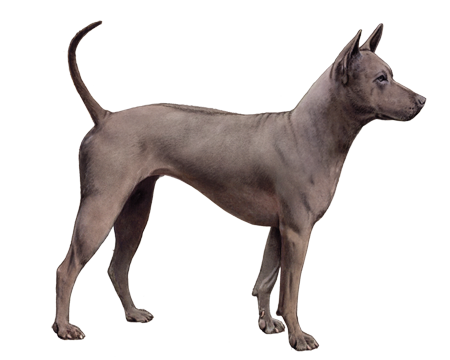
Kai Ken
A strong, energetic hunter, the Kai Ken is a pack animal that bonds with its people and makes an excellent guard dog. Kai Kens require lots of exercise and careful socialization to become well-mannered companions.
Interested in discovering if your dog is a Kai Ken?
Check out Wisdom Panel's DNA tests.

Kai Ken Traits
General Appearance
Often mistaken for Akitas with brindle coats, Kai Kens are medium-sized, muscular dogs with athletic builds. Their strong limbs make them excellent swimmers and climbers. And their brindle color pattern camouflages them during a hunt.
Like other spitz hunting breeds—such as the Kishu Ken and Jindo—Kai Kens have high-set, thick tails that curve like sickles over their backs.
Coat and Colouring
The Kai Ken is a double-coated breed with a soft, dense undercoat and thick, straight and coarse outer coat. Three colors are allowed under the Kai Ken breed standard: black brindle, red brindle, and brindle. Kai Ken puppies are often a solid color at birth, and brindle patterns emerge as the dogs grow. Their coloring and patterns of their coats continue to change during the first five years of life.
Distinctive Physical Traits
Brindle coats are among the breed's most distinctive features, earning the Kai Ken the nickname "Tiger Dog."
Kai Ken Temperament
The Kai Ken is both active and eager to please. Though reserved around strangers, the breed prefers to be a member of a pack. It is famously devoted to its people—forming strong attachments and working as a steadfast guardian.
Bred as a hunting dog, the Kai Ken retains a strong desire to hunt and may view smaller animals as prey. These dogs are excellent climbers known to climb trees in pursuit of game during hunts. These same climbing skills make Kai Kens escape artists that require tall, secure fencing.
With adequate exercise, a Kai Ken makes an excellent apartment dog as it is quiet and clean and will happily relax alongside its owners.


Kai Ken History
The Kai Ken's name comes from its place of origin: the Kai province near Mount Fuji. Locals appreciated the breed for its stamina and strong prey drive. They used these dogs for hunting all types of game—from pheasants to bears.
There are two different lines of the Kai Ken: the stockier, bear-like Kaikuro, and the thinner, long-bodied Dairo. Both have similar traits, strength, speed, and agility.
Kai Kens are popular in Japan, revered as excellent guardians and national treasures. The Japanese declared the Kai Ken a Natural Monument, or protected breed, in 1934. But it's rare to find a Kai Ken outside of Japan.
The breed came to the United States in the 1960s as a gift from Japan to the Utah Zoo. But the dogs did not produce pups, and American breeders did not start producing litters of Kai Ken puppies (using dogs purchased from registered breeders in Japan) until the 1990s.
Kai Ken Care
Nutrition
Kai Kens naturally regulate their food intake. So, free-feeding this breed is fine as long as the dog maintains a healthy weight. Like all breeds, Kai Kens thrive on a diet of high-quality, age-appropriate dog food.
Grooming
The Kai Ken is a low-maintenance breed. An occasional brushing to remove loose fur and a little extra attention during semi-annual shedding periods (when Kai Kens blow their coats) will keep this double-coated breed to look its best.
These are clean dogs that require few baths and usually don't develop a smell. But trimming nails, cleaning ears, and brushing teeth should be part of your Kai Ken's grooming routine.
Exercise
Kai Kens excel at fast-paced sports that take advantage of their speed and stamina. Tracking, hunting, lure coursing, dock diving, flyball, agility, and obedience training are excellent ways to help Kai Kens burn energy and display their natural skills. These dogs are also strong swimmers and love any opportunity to splash about in the water.
When in an unsecured area outdoors, you should always keep your Kai Ken on a leash. Otherwise, the breed may give in to the instinct to hunt and run off. With the right amount of exercise—including regular walks—Kai Kens can adapt to apartment living. But without enough activity, they may become stressed and destructive.
Training
Kai Kens are smart and eager to please, which makes them a pleasure to train. But they don't respond well to harsh training methods. So, stick with positive, rewards-based training. Offering praise, treats, and toys will enhance your bond with your Kai Ken—leading to more training success.
The Kai Ken is less independent and more willing to please their owners than other native Japanese breeds. Still, consistent training is essential, as it will help temper your dog's guarding instincts. Early socialization, including positive introductions to strangers and unfamiliar dogs, can also reduce defensive or aggressive tendencies.
Breed Group
Asian and Oceanian
The Asian and Oceanian group is comprised of breeds whose origins lie in Asia, which have spread as far as Australia, the islands of the Pacific, and the Arctic. This group is possibly the most ancient of all breed groups and were bred for a variety of purposes, including guarding, hunting, and as draft dogs.
Resources
https://www.akc.org/dog-breeds/kai-ken/
http://www.fci.be/Nomenclature/Standards/317g05-en.pdf
Reviewed 26 July 2020 by Cindy Elston, DVM, MPH






















































